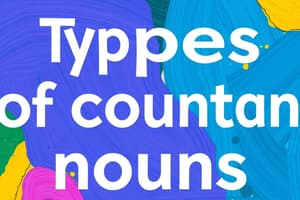Podcast
Questions and Answers
Which of the following is an example of a proper noun?
Which of the following is an example of a proper noun?
- Sarah (correct)
- dog
- city
- happiness
Common nouns can be capitalized anywhere in a sentence.
Common nouns can be capitalized anywhere in a sentence.
False (B)
What type of noun represents ideas or qualities that cannot be perceived by the senses?
What type of noun represents ideas or qualities that cannot be perceived by the senses?
Abstract Nouns
A ______ noun refers to physical objects that can be experienced through the senses.
A ______ noun refers to physical objects that can be experienced through the senses.
Match the following types of nouns to their definitions:
Match the following types of nouns to their definitions:
Flashcards are hidden until you start studying
Study Notes
Types of Nouns
-
Proper Nouns
- Refers to specific individuals, places, or organizations.
- Always capitalized (e.g., Sarah, Paris, Microsoft).
- Distinguishes unique entities from general categories.
-
Common Nouns
- General names for a person, place, thing, or idea.
- Not capitalized unless at the beginning of a sentence (e.g., city, dog, happiness).
- Can be singular or plural (e.g., book/books).
-
Abstract Nouns
- Represents ideas, qualities, or conditions that cannot be perceived by the senses.
- Examples include concepts like love, freedom, and intelligence.
- Often derived from adjectives or verbs (e.g., beauty from beautiful).
-
Concrete Nouns
- Refers to physical objects that can be experienced through the senses.
- Examples include apple, car, and music.
- Can be counted (e.g., chairs) or uncounted (e.g., water).
-
Collective Nouns
- Denotes a group of individuals or things considered as a single unit.
- Examples include team, flock, and audience.
- Can represent people (e.g., committee) or objects (e.g., bunch of grapes).
Types of Nouns
- Proper nouns denote specific entities, always begin with a capital letter, and include names of people (e.g., Sarah), places (e.g., Paris), and organizations (e.g., Microsoft).
- Common nouns are general terms for people, places, things, or ideas, not capitalized unless starting a sentence, and can be singular or plural (e.g., city, dog, books).
- Abstract nouns signify concepts or qualities that cannot be sensed physically; examples are love, freedom, and intelligence, often derived from adjectives or verbs (e.g., beauty).
- Concrete nouns identify tangible objects that can be experienced through the senses, such as apple, car, and music, and can be either countable (e.g., chairs) or uncountable (e.g., water).
- Collective nouns refer to groups of individuals or things treated as a single entity, with examples including team, flock, and audience, encompassing both people (e.g., committee) and objects (e.g., bunch of grapes).
Studying That Suits You
Use AI to generate personalized quizzes and flashcards to suit your learning preferences.




